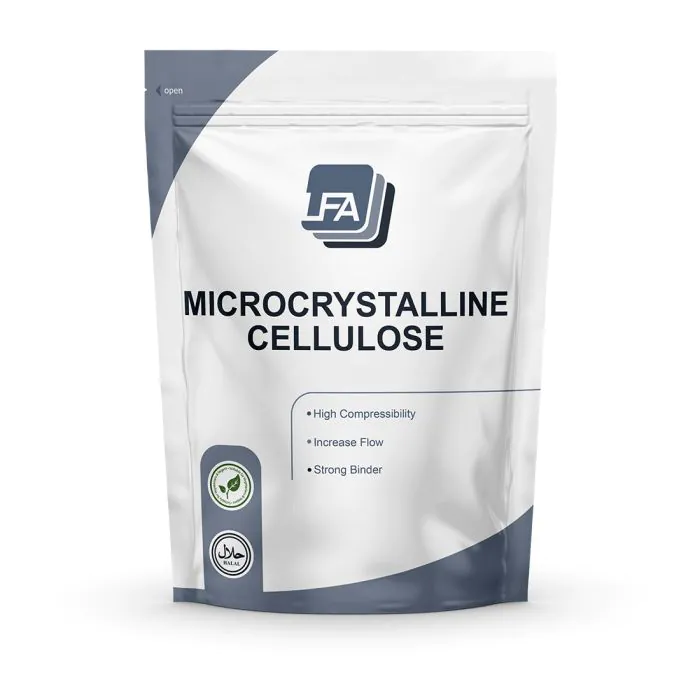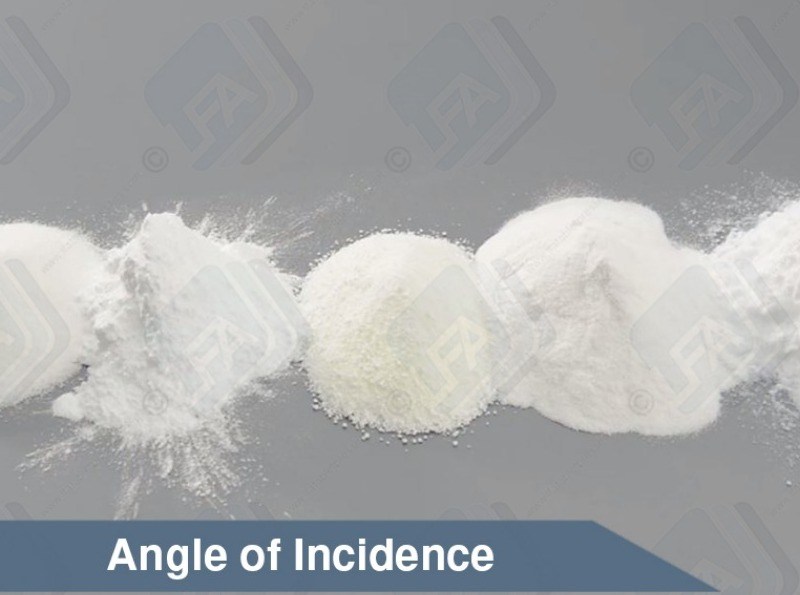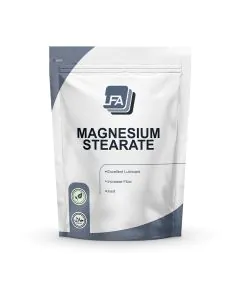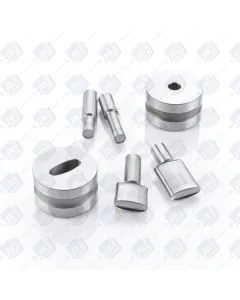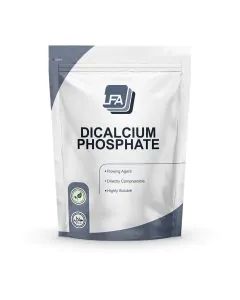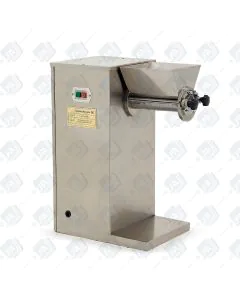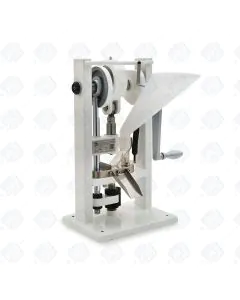Was genau ist der ideale Hilfsstoff? Derjenige, der die Einnahme für die Kunden erleichtert und die Fertigung für den Produzenten einfacher macht. Nicht nur ein zugelassener Hilfsstoff, sondern einer, der sich über die Standardfunktionen hinaus erstreckt. Mikrokristalline Cellulose kann genaue das Bindemittel sein, nach dem Sie suchen. Es wird nicht wie das Methylcellulose Gel und bietet im Vergleich zu anderen Bindemitteln das optimale Maß an Sprödigkeit und lässte es weiterhin Schmiermittel empfindlich bleiben.
Hauptvorteile der Mikrokristalline Cellulose
- Höhere Verdichtbarkeit
- Erhöhter Fluss
- Starkes Bindemittel
- Geruchlos, geschmacklos
- Nicht reaktiv
- Geringe Feuchtigkeitsaufnahme
Mikrokristalline Cellulose, im allgemeinen als MCC bekannt, wird in einer kontrollierten Umgebung hergestellt. Das Endergebnis ist ein reines, weißes Pulver ohne Geschmack oder Geruch, welches Ihren Tabletten Form und Härte hinzufügt. MCC erhält die notwendigen Vorteile eines Verdünnungsmittel. Es wird als Füllstoff in Ihrer Tablette oder Kapsel benutzt, um Ihrem Kunden das gewünschte Gewicht zu geben. Mikrokristalline Cellulose hat eine minimale Schüttdichte und erhöht die Fließfähigkeit. Ein ungehinderter Fluss stellt sicher, dass jede Zutat konsequent verteilt auf eine Mischung verteilt wird. Wenn die Mischung konsistent ist, wird jede Tablette am Ende der Produktion die gleiche Menge jeder Zutat besitzen, und ein qualitativ hochwertiges Produkt schaffen.
Warum Mikrokristalline Cellulose
Mikrokristalline Cellulose macht wirklich ihren Job, und das richtig gut. Sie funktioniert auch in Verbindung mit vielen anderen populären Hilfsstoffen und ist ein integraler Bestandteil von vielen Hersteller Formeln. Bindemittel sind zweifellos ein wichtiges Element bei der Tabletten Herstellung, einfach deshalb weil sie für die Härte in einer Tablette sorgen. Darüber hinaus wirkt sich die Kompressibilität auf alle Aspekte des Endprodukts aus, z. B. Zerfall, Auflösung und Resorption. MCC ist direkt komprimierbar und daher in eine Tablette, ohne Granulat oder eine Mischung, gepresst werden, und macht die gesamte Herstellung effizienter.
Kompressibilität und Bindung sind beides unbestreitbare Eigenschaften der Mikrokristallinen Cellulose. Keines dieser Merkmale beeinträchtigt jedoch die Fähigkeit, wenn bereits in Tablettenform, die einfache Auflösung einer jeden Tablette oder Kapsel. MCC ist sicher wenn in normalen Mengen konsumiert, und wird im großen und ganzen als Hilfsstoff für die Tablettierung verwendet. Außerdem ist es eine natürliche Quelle für Ballaststoffe und ist frei von Kalorien. Vor allen Dingen ist MCC inert, d. h. sie reagiert nicht mit anderen Substanzen oder beeinflusst diese.
LFA´s Meinung
Alles in allem könnte es das Produkt sein was Sie suchen. Es ist begehrt, da es zu den Top Verdünnungsmitteln mit herausragenden Bindungsqualitäten gehört, und diese Eigenschaften auch an Sie weiter gibt. Ihr Prozess der Herstellung wird durch diese Zutat erleichtert werden. Mit ihren Vorteilen und Verwendungen ist mikrokristalline Cellulose die ideale Wahl für Bindemittel. MCC neben anderen Hilfsstoffen zu nutzen lässt die Produktion reibungslos und effizient ablaufen.
Schreiben Sie eine Bewertung
Are all excipients safe for all ages to consume?
Yes, it does not matter what age, size or sex the person consuming the products is. It is, however, important to check the intolerance data.
Are all the excipients safe for human consumption?
Yes, all of the excipients are safe for human or animal consumption. There are some precautions that should be taken when handling them and there are some people that might have intolerances to some of them. Information on this can be found in the products MSDS and Intolerance Data Sheet. This can be found in this section for every excipient.
Are there any known allergens or health risks?
Sind Ihre sonstigen Bestandteile natürlicher?
Ja, alle unsere sonstigen Bestandteile sind, gewonnen aus natürlichen Quellen. Für weitere Informationen besuchen Sie bitte die einzelnen Produktseiten.
Can I have a CoA for my Excipient?
Yes. CoA stands for Certificate of Analysis this is also known some times as an MSDS (Material Safety Data Sheet) all of the information contained in a CoA is inside the MSDS for every LFA product which is emailed to you after purchase.
Kann ich produzieren Tabletten ohne Hilfsstoffe?
Es ist unwahrscheinlich, dass Sie in der Lage zu produzieren Tabletten ohne Hilfsstoffe überhaupt. Bestimmte Produkte binden, ohne Hilfsstoffe, aber dann nicht fließen durch die Maschine. Wir empfehlen, dass Sie eine
Dissolving rate? Any known factors that can affect the rate, speed up or slow down the breakdown of a tablet?
Yes. There are two things at play here. You can get hygroscopic and hydrophobic excipients. Hygroscopic means that they take on water quickly, while hydrophobic means that they repel water.
There are products know as supper disintegrants. These products help the breakdown of tablets. At the moment LFA does not sell any supper disintegrants.
Magnesium stearate is hydrophobic this means that it will slow the breakdown of a tablet.
However, it is used in such small amounts that most of the time it will not make a difference to our customer's products. If they would like to be sure then they should conduct what is known as a disintegration test.
How long is the storage period of each excipient? What is the shelf life?
Firmapress - 2 years form batch date.
Dextrose - 3 years from batch date.
Dicalcium Phosphate - 3 years from batch date.
Microcrystalline Cellulose -
Magnesium stearate -
Lactose - 2 years from batch date.
Silica Dioxide - 2 years from batch date.
How should I clean contact parts that have come into contact with my excipients or active ingredients?
here are 6 steps that should be followed as a general rule of thumb when cleaning contact surfaces that have come into contact with powders:
Dry Clean - First you need to remove as much of the dry powder as possible. You can do this using a hover/vacuum. Make sure that the vacuum you are using has a filter good enough to handle fine dust.
Wet Clean - Next you need to perform a wet clean. This can be done with warm water and soap or if available an ultrasonic cleaner.
Rinse - Next you need to rinse off any soap with potable water (drinking water). You do not have to do this if you used an ultrasonic cleaner in the last step. It is important to ensure that all parts are thoroughly dried immediately after washing to avoid any rusting.
Sanitise - Next you need to sanitise the surface. This step is recommended by the FDA. There are a number of sanitising solutions available designed to be applied and left on.
Lubricate - You now need to lubricate any parts that require it. This should be with the appropriate grade oil or grease considering your use and greasing chart. Store - Finally store any of the parts in a cool dry place. If you are storing them on the machine then make sure the machine is in a temperature controlled environment with low humidity.
Was ist der Unterschied zwischen der Bereich der sonstigen Bestandteile?
Was ist der Unterschied zwischen der Bereich der sonstigen Bestandteile?
Wir bieten Mikrokristalline Cellulose, Magnesiumstearat, Dicalciumphosphat und Firmapress in unserem Bereich der sonstigen Bestandteile.
Mikrokristalline Cellulose ist ein Bindemittel, das hält den Inhalt der tablet zusammen.
Dicalcium-Phosphat ist ein fließender agent und hilft bewegen Zutaten durch die Maschine, bevor Sie komprimiert sind.
Magnesiumstearat ist ein trocken-Schmiermittel und hilft wieder mit der Bewegung der Inhaltsstoffe durch die Maschine, sondern hilft auch bei der Auswurf der Tabletten aus der Maschine. Bitte beachten Sie, dass Magnesium Sterate nicht binden von selbst.
Firmapress ist eine all-in einer Mischung aus Mikrokristalliner Zellulose, Magnesiumstearat und Dicalciumphosphat.
What is the mesh size of your excipients? etc.
Dextrose - approx 100 mesh
Dicalcium Phosphate - approx 100 mesh
Microcrystoline Cellulose - approx 120-200
Magnesium sterate -
Lactose - 80 mesh
Silica Dioxide -
Firmapress - 100-200 mesh
What kind of agent is each excipient?/ What is the main use of each excipient?
Dextrose - Sweetener, binding agent, good for chewable tablets or candy.
Microcrystalline Cellulose - Binder, filling agent. Good at binding tablets and making them bigger. It can also be used as a filler for capsules.
Magnesium stearate - Dry Lubricant. This stops products from getting stuck to the tooling. It can also help with powder flow issues and caking issues.
Lactose - Binder, sweetener and bulking agent. It has a large mesh so it flows well but most people do not like it because of the intolerance issues.
Silica Dioxide - Flowing agent. This assist powders in flowing smoothly through the machines. It also helps with cacking issues where powders get stuck to the machine.
What kind of condition should excipients be stored in?
Firmapress - 2 years form batch date.
Dextrose - 3 years from batch date.
Dicalcium Phosphate - 3 years from batch date.
Microcrystalline Cellulose -
Magnesium stearate -
Lactose - 2 years from batch date.
Silica Dioxide - 2 years from batch date.
Which excipient should I add if the product doesn't bind well?
If your product does not bind well then we would recommend using MCC. This can be used in any % the limiting factor is the size of the tablet.
If the amount of MCC you would have to use would be too much or if you do not want to use MCC then you have 3 other options: Ask your supplier for a directly compressible or tabletable grade of your product. Spray dry your product. Wet granulate your product.
Which excipient should I add if the product is sticky?
If your product is sticky then you will need to add a dry lubricant to your mix. For this, we recommend magnesium stearate.
We do not recommend that you add more than 1% to the mix as more than this can cause capping. If your product is still sticky at this point then we would recommend looking into granulation.
Which excipient should I add if the product/API is clumpy?
If your product or API is clumpy then you will need to add an anticaking agent. For this, we recommend silicon dioxide. We only recommend adding a maximum of 2% of this to the mix

